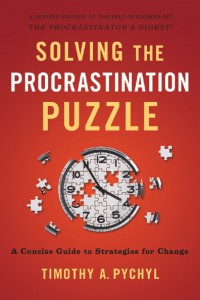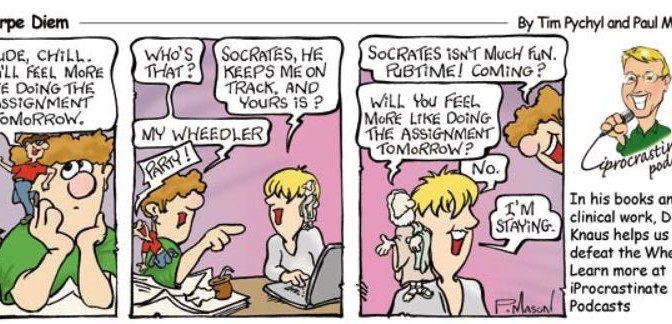 Real solutions for procrastination from Dr. Timothy A. Pychyl, part 2
Real solutions for procrastination from Dr. Timothy A. Pychyl, part 2
Student Success Podcast No. 14, Jan. 22, 2014, recorded Jan 15, 2014
Today’s Guest: Timothy A. Pychyl, Ph.D.
Dr. Pychyl shares his incredible knowledge, experience, research, and insight into the nature of procrastination and how to overcome it. Dedicated to bettering people’s lives, he uniquely applies academic concepts in a way we can all understand and appreciate.
This is part 2 of 2 segments we are publishing on the Student Success Podcast. Tim has also published his own version of the interview on his “iProcrastinate” podcast.
Please see more from Dr. Pychyl at the Resources links below.

Subscribe to Student Success Podcast RSS
or find us on iTunes
Guest Biography
Dr. Timothy A. Pychyl is Director, Centre for Initiatives in Education & Associate Professor, Department of Psychology, Carleton University, Ottawa. Applying his expertise in Psychology and his deep desire to help people, Dr. Pychyl teaches, writes, blogs, podcasts, and runs conferences on procrastination. Dr. Pychyl gladly shares with readers his own experiences as a parent and person who struggles, like us all, to get things done. Well, he does more than most of us, including to keep a team of sled dogs, but even he has to force himself to get things done sometimes.
Topics Discussed
- See below for detailed bulleting of this conversation
Resources
- Don’t Delay blog from Psychology Today
- The Procrastination Research Group from Carleton University
Easy to remember url: http://procrastination.ca/ - About page from the Research Group for Dr. Pychyl, including links to his “mushing” (sled dogs) and his life as “Mr. Mom.”
- Carpe Diem cartoon on Procrastination
- Solving the Procrastination Puzzle book by Timothy A. Pychl (Amazon.com link)
- Wall Street Journal article featuring Dr. Pychyl: To Stop Procrastinating, Look to Science of Mood Repair
- iProcrastinate podcast
- iProcrastinate podcast episode of this interview
- Dr. Pychyl’s Teaching Philosophy
Credits
Host: Michael L. Bromley
Original Music by Christopher Bromley (copyright 2011, 2013)
Background snoring: by Stella
Best Dogs Ever: by Puck, Stella, & Artemis:

Here for Puck & Stella slideshow
Show Notes
- Bromley:
- What is the relationship between anxiety and procrastination
- His daughter explained this to me: is it fear of things, personality?
- Tim:
- His daughter struggles with reading
- She has developed strategies to get around it
- Amazing how good we are at coping strategies
- As for anxiety, a couple levels:
- it is partly personality, because conscientiousness is a trait
- There are five major personality traits that are the primer for personality
- Conscientiousness
- Agreeableness: how nice you are
- Neuroticism: how nervous or anxious or worried you are
- Openness to experience: curious, enjoy learning
- Extroversion/ Introversion: how social you are
- Of the five: conscientiousness speaks to discipline, organization and dutifulness
- People low on conscientiousness procrastinate more
- We come into the world w/ these traits, or a bias
- High hereditability
- Some of us come into the world not ready for organization
- Add to it attention deficit disorder
- Trouble remembering things, keeping focus where they want to
- Mindfulness helps with this
- A researcher of his was neurotically disorganized which made him a procrastinator
- There is a truth to people who say I’m just not organized
- Trouble remembering things, keeping focus where they want to
- But there are strategies for intervention with this:
- Eliminating distractions
- Accountability
- Making lists
- Calendar where items don’t drop off until done, like you do in A+ Club
- In some ways these are easy to people to help
- Impulsive people, however, need different help, more difficult
- They can’t protect one intention from another
- Instead of helping w/ organization, have to help them make implementation intentions around pre-decisions not to follow impulse
- You make the implementation intention this way:
- “If my friends ask me to go out tonight, then I will say no because I have my work to do”
- Seems like a crazy thing to say
- How will that be a factor?
- Research shows that it is:
- Because we’re not leaving it to the last minute to make that decision when we’re tempted to give in to feel good, yeah,
- But I already made that decision, so my answer is “no”
- A number of factors influence procrastination, dance together
- Any one of us might be predominate in one or the other
- These will help:
- Day timers
- Accountability to others
- To do lists
- Structured implementation intentions
- His daughter struggles with reading
- Bromley:
- Your podcast discusses how some people put tasks that are already done on their to do lists just to check them off
- We find same thing:
- Students are supposed to log assignments in our HomeworkTracker
- If they speak to the system, they’re more likely to do it
- They don’t always, and we assist them, we combine
- Some kids log in only to close out assignments b/c that’s satisfying
- They say I love clicking on the button “done”
- Tim:
- Yes! Then grow that into time travel:
- So won’t it be great tomorrow when you check off done b/c you put in the time today?
- If they say, “But I don’t feel like it”
- Then you respond:
- You know, you’re motivational state doesn’t have to match the task at hand. It seldom does.
- Attitudes follow behaviors
- If you can get it started, … >> you’re going to realize you felt more like it than you realized
- We’ve done studies on people finally doing their work
- They don’t say “I’m glad I waited until today because I work better under pressure”
- Instead they say “I wish I had started earlier, because this isn’t as bad as I thought it would be
- If I had more time I’d do a decent job
- What’s the low-threshold step here? (getting started)
- Likes the way Bromley phrases it: “how could you get started
- = not telling them they ought to or should
- nuanced difference: not saying have to, or bossing around, just “how could I?”
- then maybe can find root to getting started
- Yes! Then grow that into time travel:
- Bromley:
- We try to stay positive
- Never talk to my own daughter the way I talk to other people’s kids, could have done better
- Tim:
- Had a tutor for his own daughter
- Different relationship
- We have so much baggage sometimes
- Sometimes nice to have other people
- Takes a community to educate a child
- Different kids resonate to different teachers
- Teachers read to different students
- School should be on the same team
- All need to account that we’re trying to build self-regulatory skills
- But if we just become authoritarian, “do this!” and lay out punishments
- not fostering executive function
- non-catastrophic failure
- until they fail won’t realize “that was not a good idea
- Agree that don’t want to let tutoring be enabling
- At Carleton program:
- have students say, what will I do, what can we do as a group to learn better
- building self-sufficienty
- that’s why I’m so impressed with your program
- Had a tutor for his own daughter
- Bromley:
- Question about anxiety and procrastination
- Wondering if anxiety is also a product of procrastion
- (Dogs interlude: Stella snoring in the background, and Puck trying for a belly rub
- Tim:
- Anxiety and procrastination cut both ways
- Bishops Univ. prof worked w/ him on research
- Focused on: future self, giving in to feel good, and mood repair
- Will do a study of anxiety: how procrastination can lead to stress
- Distress can be a consequence of procrastination
- Very circular: can feed into more procrastination
- Downward spiral:
- When I don’t do something, I put myself behind the 8 ball
- The next day I’m even more anxious
- Now I’m compromising my ability to function: hard to think clearly and competent when anxious
- Then… some people get anxious beforehand:
- Internalize unrealistic expectations of others
- = a form of perfectionism: Socially Prescribed Perfectionism
- I can’t live up to it… get anxious
- Tim felt that way in school
- His daughter asked about his fears
- When? Every year different!
- In 3rd grade, worst fear was called on to read out loud
- Anxiety can precede the procrastination: I can’t do this
- Cope by not doing it
- Need someone to help
- Tutors can help here: yes you can
- Help people with anxiety to see that their anxiety is irrational and they can tolerate
- What could be the worst possible outcome?
- = Time Travel
- What would happen if you really did screw up?
- Then realize that anxiety is irrational
- Can tolerate a little and get started
- What could be the worst possible outcome?
- Clinical work on procrastination can come together on avoiding coping
- Emotional barriers to task engagement
- Anxiety can be a precursor to procrastination and follows it, part of a cycle
- Intervene w/ self-compassion, self-forgiveness
- And change approach to the anxiety
- Bromley:
- Thank our parents for giving us this!
- Tim:
- Don’t we all!
- But there’s literature on parents not being as big an influence on children as they like to think they do
- Bromley:
- “Urgency” – student said, “don’t have the urge”
- Was able to build sense of urgency and eventually did i
- “Urgency” – student said, “don’t have the urge”
- Tim:
- No evidence for “arousal procrastination” — that we don’t work well under pressure
- Evidence for errors of commission and omission when working under pressure
- But we have rose colored glasses on, b/c we’ve got have endorphins running through us, “I gotta get this done!” or the elation of “I pulled another one off!”
- Others claim “I get into a flow state”
- A theory on flow state was based on athletes, artists, etc.
- But that’s part of a complex process
- The sense of urgency of this student = focus on last minute efforts
- It is external time pressure
- Lost track of time and get hyper-focus
- But has pathos: b/c have to light a fire under my butt to get antyhing done
- Artists, athletes, writers: develop “flow” through practice
- Will stay to students, yeah I get it, you need pressure sometimes
- But if htat’s your only way of operating, why don’t we explore other ways to get started earlier — you’re kidding yourself that you’re doing your best work.
- You could be an A+ scholarship student if you started earlier
- I’ts a habit: only way to get rid of bad habit is to replace it with a new habit
- Hard work.
- In TV interview, Tim was asked, “gee, that sounds like a lot of hard work”
- Yeah, it is
- It takes commitment
- Coaches and tutors:
- Like in a gym, have to do reps
- Helpful to have someone say, “just do one more rep”
- Sports analogy easy to get: but it’s the same for academics
- Academics requires the same type of commitment
- Push a little harder, and get stronger and grow
- Develop new attentional resources
- Develop will power muscle
- And the next day you’re better at it
- Bromley
- Turning my assumptions upside down
- Used to tell students that procrastinators are “overly focused people… ” just focused on the wrong things
- Tim
- That’s true
- Procrastinators know themselves
- Work less and later
- But they’re not happy with it, even if they get As
- Would love to interview students in the A+ Club sysstem
- They would ask different questions
- They would push us to focus differentl
- Bromley:
- Really great the way you reach out to people
- Tim:
- As much as we do research, we don’t have all the answers
- This is a complex human phenomenon
- We don’t understand it from an evolutionary perspective
- It’s not adaptive
- Not everything out of evolution is adaptive, could be a by-product
- Not altruism to reach out to people
- It’s how we learn together
- Bromley:
- The key is to implement these strategies
- They are actionable, they can work
- Tim lays out a process
- Tim:
- His son will try to procrastinate making his bed, can be stubborn
- So, he offers him a dollar if he makes the bed before he counts to ten … gets it done by 6 or 7
- But we spent far more time arguing than it took to do it
- Just starting is so much of the battle
- Existential moment:
- Have the tools, such as a calendar
- Have the implementation intentions
- Minimized distractions
- But still have the visceral, “I don’t wanna”
- Then we need will
- Just gonna get started: and that can change the world
- Every day we get better and it feels good
- Then creates sense of accomplishment
- His son will try to procrastinate making his bed, can be stubborn
Here for Part 1 of this interview, published Jan 15.
